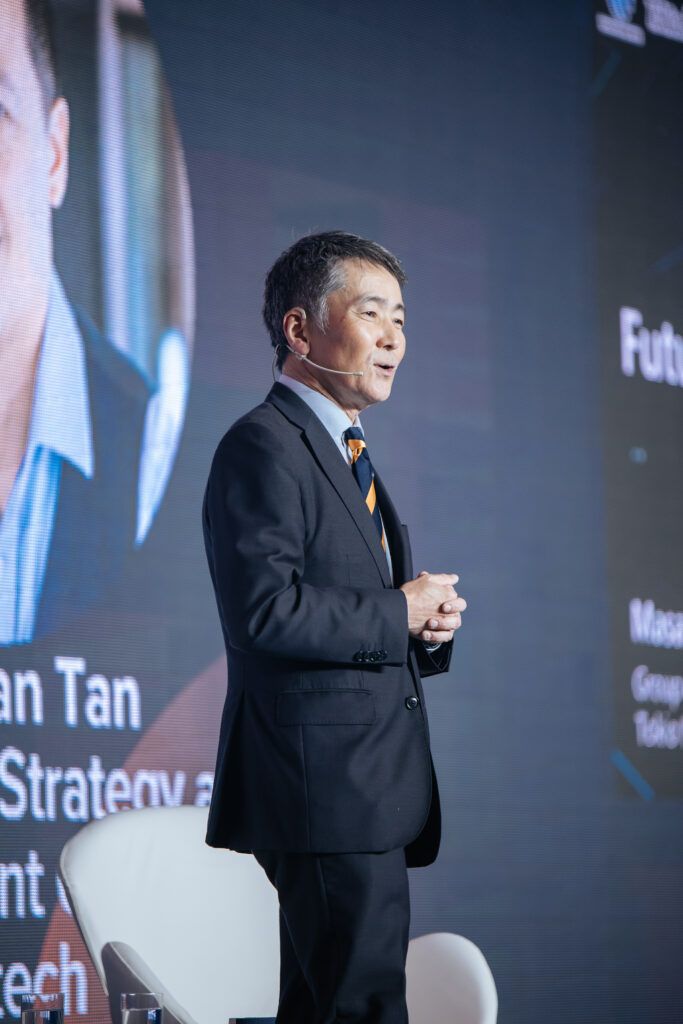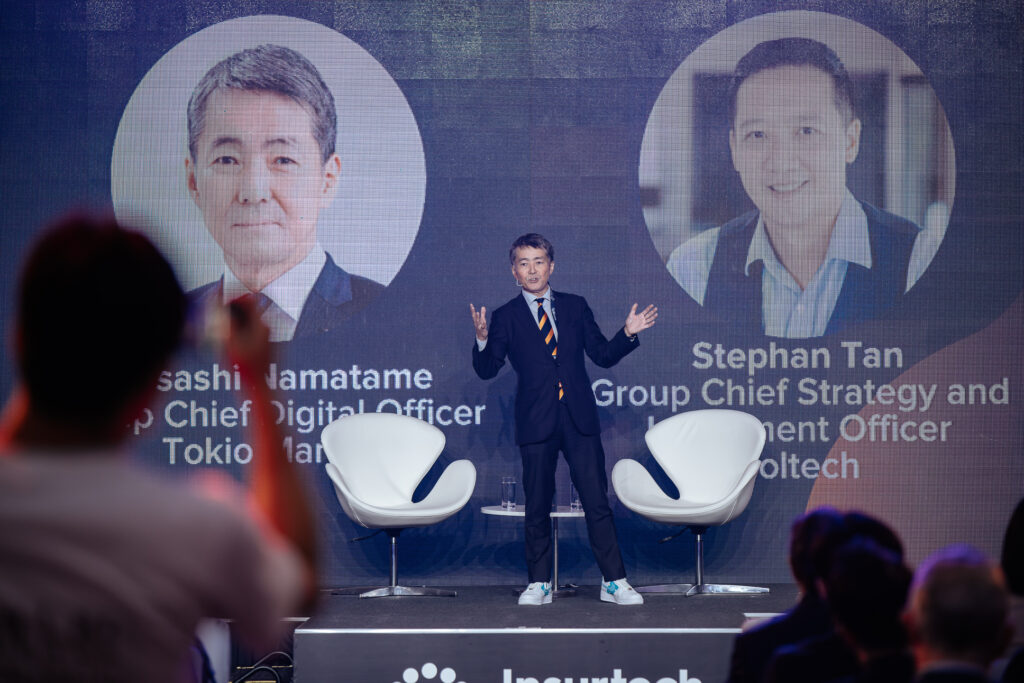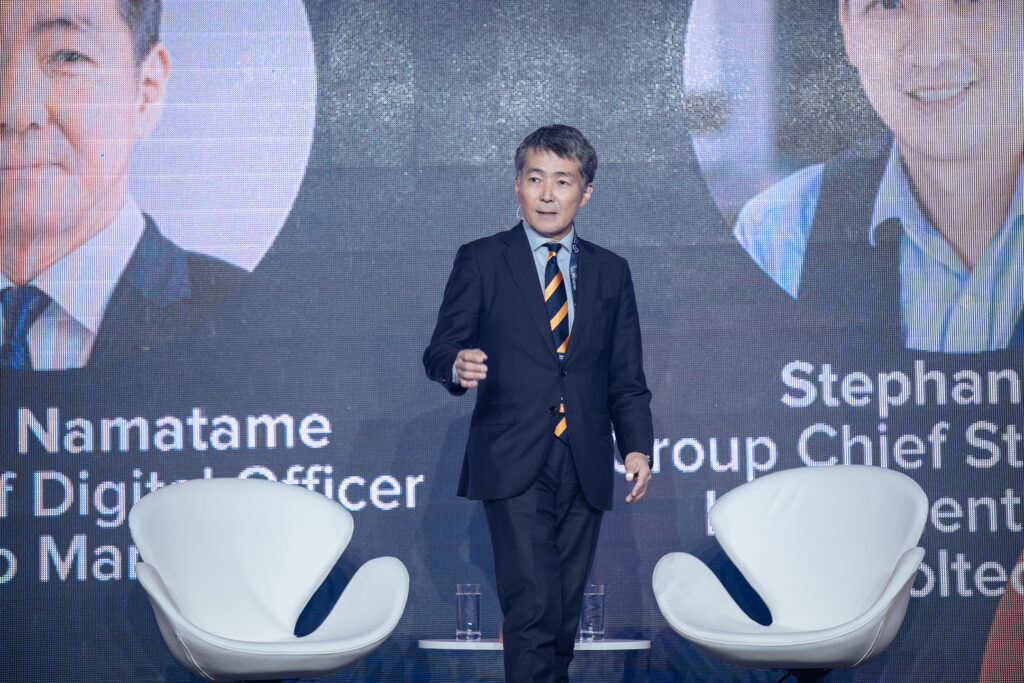With his robust financial background, which includes a previous role of Managing Director, Member of the board, Head of Corporate Strategy for BlackRock, Namatame also recently became a non executive director at bolttech Holdings. Insurtech Insights caught up with him to find out more.
Your background in finance is very strong. So why did you make the crossover to the insurance industry?
It is – but since the early days of my career, I’ve counted insurance companies among my valued clients. Over the years, I’ve engaged in numerous investment banking transactions, collaborating with various insurance companies including Tokio Marine.
In an advisory capacity, I had worked for Tokio Marine’s acquisition journey, offering financial advisory to ensure a successful outcome. Additionally, from BlackRock, I worked with Tokio Marine for its risk management tailored to meet the unique needs of Tokyo Marine.
Over the span of more than two decades, I’ve closely observed Tokio Marine’s growth in overseas markets. It’s been a remarkable evolution, transitioning from a modest 2% of the gross insurance premium to an impressive over 50% today. From my perspective, Tokio Marine stands out as one of the most dynamically expanding financial institutions on the international stage.
Can you tell me a little bit about your current role within Tokio Marine, what it entails, what your responsibilities are?
In my current role as the Managing Executive Officer Group and Chief Digital Officer at Tokio Marine Holdings, I oversee all digital-related initiatives within the group. I spearhead the digital transformation of various business processes, with a focus on insurance process automation, data analytics. These critical elements fall under my purview, ensuring a seamless and efficient digital workflow.

Another aspect of my role involves leveraging digital technology to create innovative businesses beyond traditional insurance offerings. Currently, we are actively engaged in developing new ventures related to natural disaster prevention, aligning with and expanding upon our existing P&C insurance business.
Given Tokio Marine’s expansive global presence with operations across 47 regions and countries worldwide, I am tasked with creating strategic ties among our global group companies in the digital realm. Historically, these entities may not have been closely connected digitally, but my responsibility is to foster collaboration and connectivity to form a cohesive and scalable digital strategy.
Across all three pillars of my responsibility, open innovation takes a central role. This involves actively investing in venture and startup companies, contributing to the growth and development of cutting-edge technologies and solutions.
To summarise, my role involves not only driving digital transformation within existing processes but also exploring new business avenues, fostering global connectivity, and championing open innovation through strategic investments in the startup ecosystem.
From your industry-wide perspective, what are the main challenges big insurers like Tokio Marine face in Japan and throughout Southeast Asia?
The insurance industry, much like other financial services sectors, is navigating through significant challenges. Let’s break down the key issues into three major categories.
First, the ongoing wave of digitalisation itself poses a formidable challenge for insurance companies. The emergence of generative AI, for instance, is reshaping the competitive landscape within the financial services industry. To stay ahead, it’s crucial for insurance companies to fully integrate generative AI capabilities into our entire business processes, creating a competitive edge not just against other financial institutions but within the industry itself.
Second, beyond the industry-specific hurdles, our society and customers are grappling with substantial challenges from various perspectives. Socio economic issues, geopolitical concerns, climate change, and the rise of natural disasters, coupled with an ageing society and a shrinking population, are significant factors. Healthcare-related matters further compound these challenges, making it imperative for insurance companies to address the broader needs of our customers.
And third – the pervasive use of technology, AI, and data has far-reaching effects on society, introducing both opportunities and threats.
And third, the pervasive use of technology, AI, and data has far-reaching effects on society, introducing both opportunities and threats. Cyber-related risks and challenges associated with AI present a complex landscape. In this scenario, insurance companies play a crucial role in mitigating risks and seizing opportunities for our clients, contributing to the overall stability of society.
While challenges are inherent, particularly in the property and casualty (P&C) insurance sector, they also present opportunities. As insurers, our focus should be on standing out by providing value-added services that address the evolving needs of our customers. By smartly and aggressively tackling these challenges, we not only overcome obstacles but also position ourselves to better propose and deliver value to our customers in an ever-changing landscape.
But how can insurers address issues that come from problems technology can’t solve, such as an ageing society and shrinking population?
The issue of a shrinking population is indeed a prevailing concern, particularly in countries like Japan and other developed nations. While altering demographic trends is beyond our control, it’s essential to anticipate the societal shifts that come with a diminishing workforce.
Looking ahead, the key lies in innovating and introducing new services and products that can compensate for the labour force decline. Embracing automation, mechanisation, and digitalization becomes paramount in this scenario. However, it’s crucial to acknowledge that these advancements come with their own set of risks.
Take autonomous vehicles, for instance — they emerge as a potential solution to address the dwindling number of drivers, especially in fields like transportation and logistics. Yet, the introduction of autonomous driving brings about unique risks that demand careful consideration.
As insurers, we need to take a proactive stance in designing insurance solutions tailored for autonomous vehicles in the foreseeable future. It’s a pre-emptive measure to facilitate the smooth integration of autonomous technologies into our society. The challenges are multifaceted, ranging from defining responsibilities between drivers and machines to determining how to handle and exempt risks in insurance coverage.
Analysing accident patterns and potential troubles is paramount as we envision autonomous driving becoming a daily necessity. By addressing these issues head-on, we contribute to a safer and more sustainable deployment of autonomous vehicles, playing a crucial role in adapting to the challenges posed by a shrinking population.
Tokio Marine recently partnered with bolttech. Can you tell us a little bit about that particular relationship?
We invested in bolttech a year ago in their series B funding as the lead investor for the round. I also assumed the role of executive director for the board. From the very beginning, we have had a strong alignment regarding future strategies, and we’d been on the lookout for a potential partner in our embedded insurance areas for quite a while when we connected with bolttech. In terms of their business model, their IT technology capability, and their growth momentum trajectory towards becoming a global unicorn in 31 countries, it was a great fit.

More importantly, their management capabilities, vision, and commitment to growing embedded insurance businesses worldwide are impressive. The partnership discussion went surprisingly smoothly, and we were able to reach an agreement within a matter of a few months or so.
Since then, we’ve frequently spoken about the meaningful combination of a newly created insurtech company like bolttech and a 145-year-old legacy insurance company like Tokio Marine. It’s working well, and will likely yield a meaningful outcome in the foreseeable future.
How important is the role of Insurtech to industry giants like Tokio Marine, and what are the main benefits of working together?
Technology and the use of digital tools make us smarter, faster, and more accurate. This improvement in capabilities benefits our customers and clients. Additionally, technology plays a crucial role in eliminating biases or prejudices, creating new value propositions for existing businesses. Collaborating with external startup technology companies, like bolttech allows us to generate out-of-the-box solutions and ideas that wouldn’t be achievable otherwise.Working with bolttech is also impactful, as they approach insurance-related issues from various angles—be it e-commerce, telecom, or technology perspectives. In contrast, we tend to view matters from a more traditional insurance standpoint.
Interacting with them fosters creativity and a proactive mindset, rather than a reactive one.Our strategic interaction with bolttech holds more significance than merely being one of many partners. While bolttech already incorporates 200 insurance companies on their platform, being a strategic partner enables deep discussions and mutual learning with the bolttech team.
This collaboration opens up the possibility of proposing and creating new things that wouldn’t be feasible as just one of the 200 insurance providers.Moreover, bolttech focuses on customer and societal aspects, areas where Tokio Marine may not have historically excelled. Leveraging these aspects creates additional opportunities for us.
Lastly, the people-to-people interaction is immensely meaningful. Since becoming partners, we engage in through daily, weekly, and monthly business activities, serving world-class customers. . This not only provides insightful occasions for me but also for the entire team to learn from their perspectives.
In terms of leadership strategy, we’ve had a really tough few years. Are there any strategies that you personally have employed to maximise your effective leadership that you can share with us?
In large organisations such as Tokio Marine, leadership involves seamless collaboration with all team members, navigating through the complexities of various functions. While the traditional Japanese approach has often leaned towards seniority mentality, the digital world demands a shift. In this era, seniority alone doesn’t cut it. We’re all in this together, working as a team, talking, and learning from each other. That’s the mindset I bring to the table when working with my team.
If you could change one problem in the insurance industry with a click of your fingers, which major challenge would you choose to transform?
Over the course of the company’s 145-year history, and in the broader context of the insurance industry, things have become overly complex. There’s an abundance of products, an array of risks to cover, and intricate definitions for coverage and exemptions. Ideally, insurance should be simpler, with products that are intuitively understandable by everyone. This simplicity would eliminate concerns about choosing one company over another.However, insurance companies have opted for a different route, engaging in subtle competitions over product differences and nuanced coverage distinctions to appeal to customers.
The reality is, customers don’t always prioritise these subtle variations. What matters most is whether the coverage, as a whole, can protect individuals or companies from anticipated risks.If I had the power to revolutionise the insurance world, I’d advocate for a single, comprehensive insurance product. This product would aim to provide full coverage and protection to everyone, shielding them from any potential threats or risks that may arise. The focus would shift from minor differences to ensuring holistic and robust protection for every entity involved.
Reflecting on bolttech, for example, the concept of embedded insurances brings a refreshing simplicity to customer interactions. Each customer sales point is essentially linked to one embedded insurance, streamlining the entire process. Customers no longer need to worry about comparing different insurance products independently offered by various companies.
There’s a psychological anticipation that the attachment to a specific product or service implies a meaningfully effective coverage through embedded insurances.All these diverse stories converge into one coherent narrative—the creation of a new world in the insurance industry, characterised by simplicity. That’s my observation, witnessing how embedded insurances are transforming and simplifying the insurance landscape.
What’s new on the horizon for Tokio Marine for 2024?
Currently, we’re diving headfirst into the next midterm business plan, a period where we’re looking to shift our business model from being purely insurance-oriented to a more solution-oriented approach. While insurance remains a major focus, we’re allocating additional resources to venture into new territories beyond insurance.
Think fee-based businesses, consulting, advisory, various services, software, programming, and data services. One exciting project in the works is our foray into natural disaster prevention. Remember that consortium I mentioned earlier? Well, it has grown to 106 corporations and organisations, all collaborating to develop digital solutions and services for scientifically predicting and mitigating natural disaster damages.
Now, as the CEO and president of Tokyo Marine Resilience, our newly established subsidiary, I’m leading the charge. The aim? To create innovative services under this company’s initiative, leveraging the collective capabilities and ideas of the consortium’s 106 companies. It’s a bold step, marking a significant shift in our company’s history. We’re not just sticking to the tried-and-true; we’re venturing into uncharted territories to create a powerhouse of value propositions for our customers. Exciting times ahead!
What inspires you in the insurance industry today?
To me, insurance isn’t just about covering the past mishaps; it’s a powerful force shaping the future. It’s about how individuals and companies, after facing losses, can swiftly return to their normal lives with the aid of health, natural disaster related solution, and auto insurance. It’s a forward-looking approach, a means to provide value to society.Insurance allows humankind to take on new risks that would otherwise be daunting. Take the example of auto insurance — 110 years ago, we underwrote the very first policies when automobiles were still a novelty in Japan. We believed that automobiles would become integral to our economic activities and lives.
Without insurance, their acceptance by society might not have been as seamless as it is today. The power of insurance propels industries to grow by fostering acceptance within society. A recent example is space aviation—an inherently risky venture. Insurance has played a pivotal role in enabling commercial entities to enter the space aviation arena, making it more viable and less risky. Insurance does more than protect; it creates a peaceful world. By peace, I mean it Protects, Equalises, Accelerates, Creates, and Enables (PEACE). Insurance protects individuals, equalises losses across society, accelerates societal progress, creates a new world, and empowers individuals to embrace risks and benefits of technological advancements.
Join leaders from Tokio Marine at Insurtech Insights Europe 2024
Meet leaders from Tokio Marine and see Masashi Namatame live on stage at Insurtech Insights Europe 2024. The two-day conference runs from March 20-21st at The InterContinental Hotel – The 02 in London. For more information, visit here.
Interview by Joanna England

Joanna England is an award-winning journalist and the Editor-in-Chief for Insurtech Insights. She has worked for 25 years in both the consumer and business space, and also spent 15 years in the Middle East, on national newspapers as well as leading events and lifestyle publications. Prior to Insurtech Insights, Joanna was the Editor-in-Chief for Fintech Magazine and Insurtech Digital. She was also listed by MPVR as one of the Top 30 journalist in Fintech and Insurtech in 2023.









